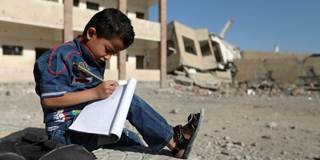Around the world, violence disrupts schooling for some 80 million children, as students and their teachers become targets in conflict zones. With the frequency of attacks increasing, the international community must recommit to a global pledge made nearly two decades ago: education for all, everywhere.
HONOLULU – My three-year-old niece believes strongly in the power of “the good guys.” Whenever I visit, she drags me to the bookshelf in her room and pulls out book after book, each with the same conclusion: in battles big or small, the good guys always win.
I don’t have the heart to tell her that, in the real world, clean fights and gratifying outcomes are the exception. Modern warfare follows no rules, and loyalties are never black and white. For me, nothing illustrates this truth more terribly than the surge in violence directed at schools and educators in conflict areas.
In May of this year, the Global Coalition to Protect Education from Attack will publish its “Education Under Attack” report, which confirms that wars and military engagements are affecting education more severely than any time in recent memory. The numbers are truly shocking. Around the world, some 80 million children are unable to attend school because of violence. In the first half of 2017, there were more than 500 attacks on schools in 20 countries, a significant increase from previous years. According to the United Nations, in 15 of those countries, government soldiers or rebel forces seized schools for military use.

HONOLULU – My three-year-old niece believes strongly in the power of “the good guys.” Whenever I visit, she drags me to the bookshelf in her room and pulls out book after book, each with the same conclusion: in battles big or small, the good guys always win.
I don’t have the heart to tell her that, in the real world, clean fights and gratifying outcomes are the exception. Modern warfare follows no rules, and loyalties are never black and white. For me, nothing illustrates this truth more terribly than the surge in violence directed at schools and educators in conflict areas.
In May of this year, the Global Coalition to Protect Education from Attack will publish its “Education Under Attack” report, which confirms that wars and military engagements are affecting education more severely than any time in recent memory. The numbers are truly shocking. Around the world, some 80 million children are unable to attend school because of violence. In the first half of 2017, there were more than 500 attacks on schools in 20 countries, a significant increase from previous years. According to the United Nations, in 15 of those countries, government soldiers or rebel forces seized schools for military use.